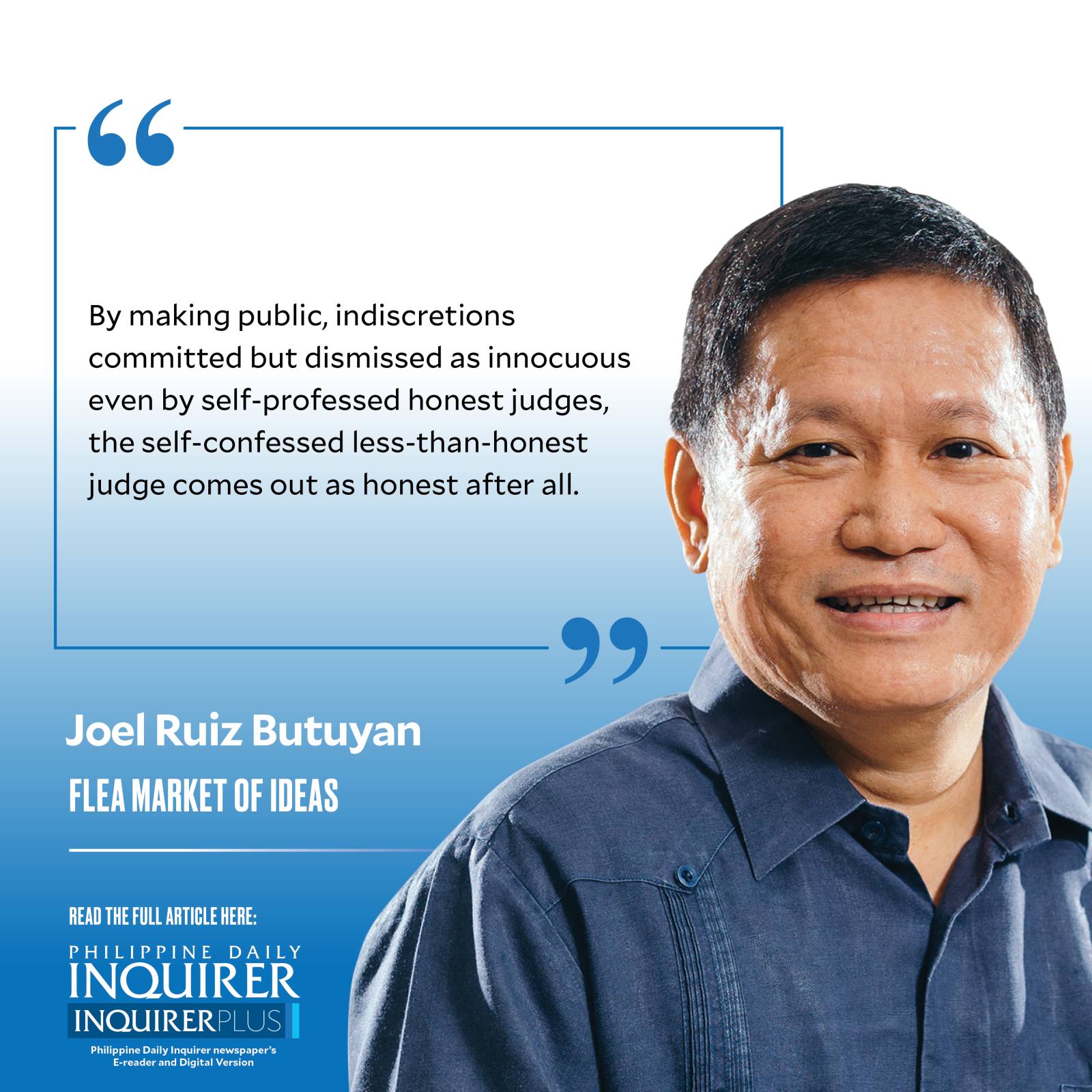‘Confessions of a less-than-honest judge’
He was an unconventional lawyer who became an unconventional judge. When he retired, true to form, he wrote an unconventional book with the above title.
Ulysses Raciles Butuyan is my double uncle on account of his being a brother to my father, and his wife a sister to my mother. I learned the ropes of lawyering under him, so I saw his unorthodox ways compared to other trial lawyers. While lawyers in general depend on parroting Supreme Court decisions (jurisprudence) as their means of winning oral and written arguments, Uncle Yul was allergic to the practice. When he was appointed judge of a Regional Trial Court in Pangasinan province, he continued to largely shun jurisprudence. Instead, he elevated common sense on a pedestal as his means of resolving conflict. At every opportunity, he employed humor to expose hollow arguments and implausible testimonies. He made fun even of himself as shown by the title he chose for his book.
Article continues after this advertisementThe book compiles Judge Butuyan’s short essays on a range of societal issues, and some of his court decisions in condensed form. While the articles tackle varied subjects, they uniformly exhibit the writer’s out-of-the-box thinking, and his habitual resort to ridicule as his means of ferreting out truth from falsehood. With the titles of some of his essays alone, one gets titillated to dive right in and read. In “How to Accept a Bribe,” he narrates an incident when a lawyer—who won a case in his court—paid him a visit in order to deliver an expensive “token of … personal gratitude and appreciation.” How Judge Butuyan superficially “accepted” the gift but essentially rejecting it in reality, and still allowing the spurned gift-giver to save face, is a testament to his ability to employ idiosyncratic solutions that work.
In “Care to Know How to Decline a Bribe?” the judge recalls the “Yakuza” texting him to influence his decision, by threatening him that “[w]e know where your family resides.” The judge texted back: “Really! But please don’t threaten me. I fear no one except my wife.” After a couple of days, the “Yakuza” texted again: “We are prepared to reward you P4 million anytime.” The judge replied: “I am a poor man. Frankly, I am considering to accept your offer on this condition: before you come with the reward, and to avoid detection, please convert your P4 million into 25-centavo coins. Together we will count the 16 million coins in the privacy of my home residence and with my police escort guarding us from anyone spying around.” He never heard from the Yakuza again.
He captioned his court decisions with catchy titles. In “Papaya is a Forbidden Fruit,” the judge recounts a criminal case he decided upon, involving an 11-year-old girl who went to her neighbor’s house to beg for a papaya. She thereafter complained that she was raped by the 50-year-old father in her neighbor’s house, presenting a medical certificate to prove her accusation. Among other defenses, the accused offered the theory that when the girl climbed the papaya tree, she might have fallen on the ground and landed on a papaya fruit which caused the laceration on her private parts. Judge Butuyan dismissed the theorized defense, and convicted the accused, by reasoning out that “[n]o record of wonders exists showing that a newly picked papaya fruit stands on end beside the trunk when it drops down from its tree.”
Article continues after this advertisementIn “Did Monkeys Evolve From Humans?” the judge narrated the case of a young man who was walking home from a birthday party, and who saw a cow on the loose and grazing on newly planted palay. He took the cow by its rope and tethered it down to a stump away from the plants while two farmers were working some 10 meters away. Suddenly, two men came running in his direction, struck him with a baseball bat, and mauled him as he tried to explain. He was dragged unconscious to the village center, and the police hauled him to jail, without asking questions. In acquitting the accused, Judge Butuyan reasoned out: “Could the Court buy the prosecution’s story that at 5:30 p.m. … with the summer sun still staring down on every man, beast and fowl in the open fields … a stranger like the accused, alone and defenseless, would dare snatch away a cow from right under the very noses of local residents then busying themselves nearby? It was a story that should send every sailor and marine blushing!” He went on: “The Court laments that although the concept of due process is as old as Creation itself, humans, like primates, have remained largely precipitate, arbitrary, and unyielding to reason.”
So what confessions were made by the magistrate-writer in the book? By making public, indiscretions committed but dismissed as innocuous even by self-professed honest judges, the self-confessed less-than-honest judge comes out as honest after all.
—————-
Comments to fleamarketofideas@gmail.com

















